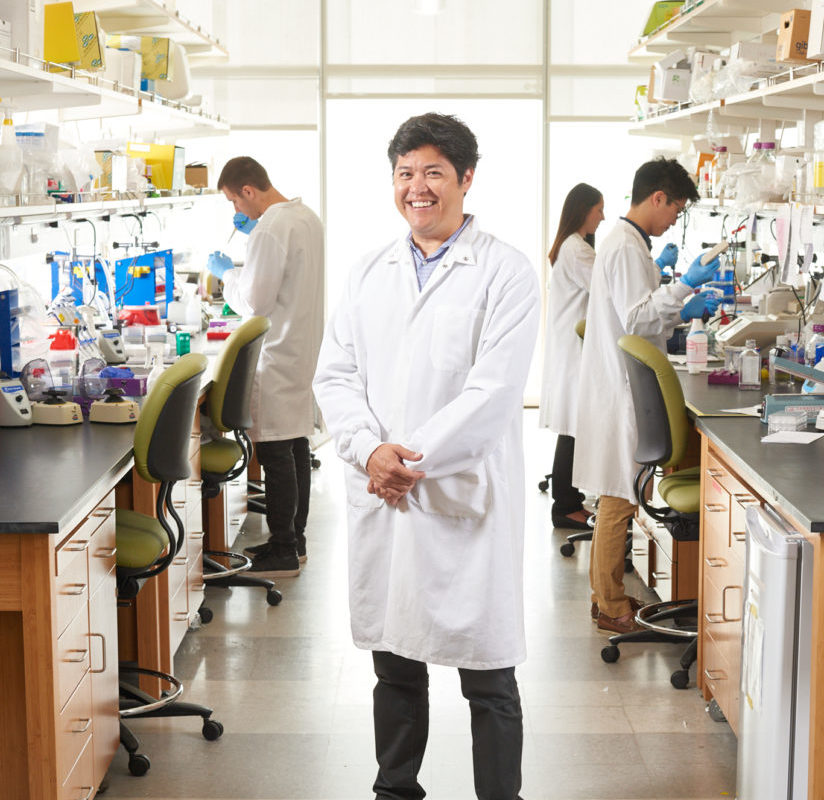
Story courtesy of Trojan Family Magazine
Justin Ichida regularly gets emails from strangers asking the same urgent question: “Will your research on ALS be done in time to save my life?”
The emails are a constant reminder that he’s in a race against time. “I don’t really know them, but they tell me their whole story,” says Ichida, Richard N. Merkin Assistant Professor of Stem Cell Biology and Regenerative Medicine and a scientist with the USC Stem Cell program. He hopes one day to have the answers they want to hear.
Ichida studies the genetic components of ALS, also known as amyotrophic lateral sclerosis or Lou Gehrig’s disease, to seek a cure for the progressive neurodegenerative condition. In 2018, his lab had a breakthrough, pinpointing a drug that seems to halt the progression of the disease in a certain type of ALS. About 10% of ALS patients have this type. The advance offered a sign of hope.
ALS attacks nerve cells in a steady march that weakens muscles, leaving the sufferer physically paralyzed but mentally intact. Those with ALS generally live only two to five years after diagnosis. “It’s our responsibility to put in 110% to make sure that we’re doing the best possible job in finding a cure for these people,” Ichida says.
Sometimes he wishes he could just lock the door of his lab and keep working until he finds an answer. He thinks about the women and men who are struggling — patients like Nanci Ryder.
Ichida first met the Hollywood publicist when Ryder visited his lab in 2015. A prolific ALS fundraiser with a ready sense of humor, she could still move and talk then. Her quick-fire jokes and sarcastic comments made Ichida laugh. But when Ichida went to see Ryder at her home the next year, he found ALS had completely paralyzed her. Health aides had put signs up on the wall reading “yes” and “no.” She responded to questions with her eyes, looking to one sign or the other. Yet her mind is likely as engaged as ever, Ichida says.
Relationships with people like Ryder motivate his nonstop search for a cure. Ichida’s love of science started as a child when he read Jurassic Park, the novel about the chaos that ensues after creating genetically engineered dinosaurs.
“The idea that all you needed was DNA to recreate life — I thought that was fascinating,” Ichida says. “I wanted to do that in real life.”
In a way, that’s exactly what his lab does. For years, scientists have been stymied by their inability to study living nerve cells. They’re inaccessible in patients who are alive. But researchers in Ichida’s USC lab managed to take skin cells from people who have ALS and, using DNA, converted those cells into motor neuron cells. Then they could watch those nerve cells act out ALS in a petri dish.
Ichida joined with other scientists and investors to launch a start-up business, AcuraStem, to focus on ALS drug therapy development. Otherwise, he fears, his discovery for the relatively small ALS market could get nowhere at a big pharmaceutical company with more lucrative targets.
Since forming in 2016, AcuraStem researchers have discovered many drug candidates that they’ve geared for human clinical trials. One day, they hope these drugs can be used by ALS patients to preserve or rescue their neurons before they lose the ability to walk, talk, swallow or breathe. With his inbox full of pleas from patients and their desperate loved ones, Ichida knows there’s no time to waste.
